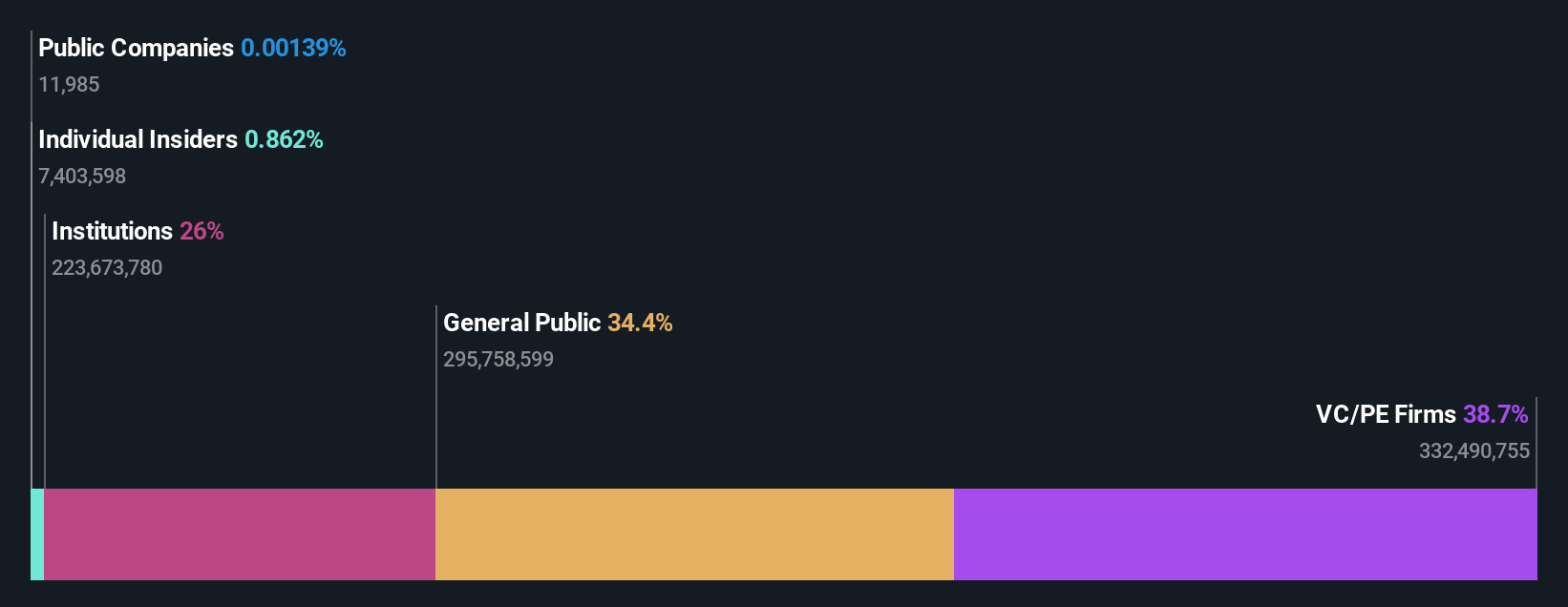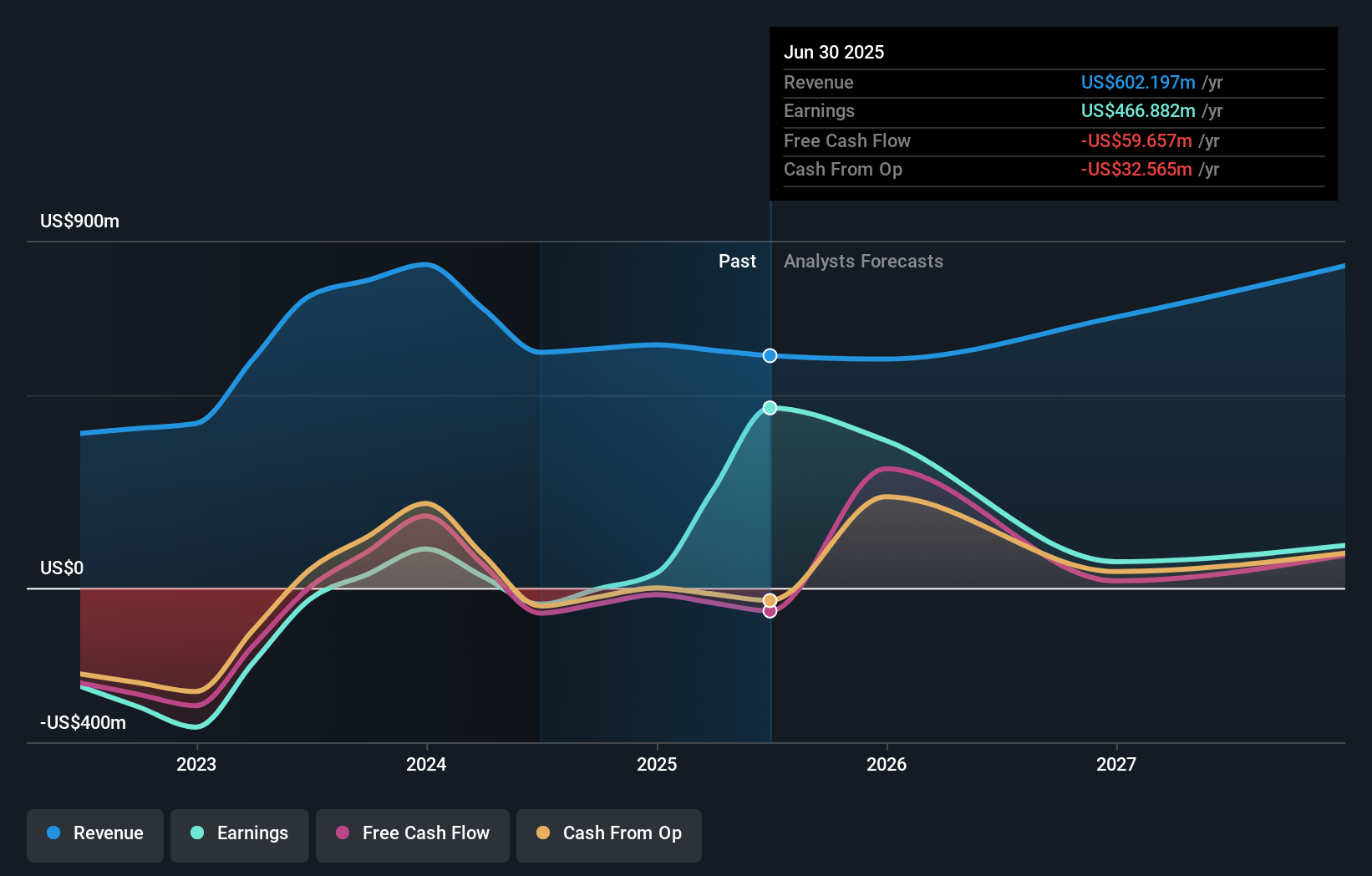- United Kingdom
- /
- Pharma
- /
- AIM:HCM
HUTCHMED (China) Limited's (LON:HCM) stock price dropped 6.8% last week; private equity firms would not be happy
Key Insights
- HUTCHMED (China)'s significant private equity firms ownership suggests that the key decisions are influenced by shareholders from the larger public
- A total of 7 investors have a majority stake in the company with 51% ownership
- Institutions own 26% of HUTCHMED (China)
If you want to know who really controls HUTCHMED (China) Limited (LON:HCM), then you'll have to look at the makeup of its share registry. With 39% stake, private equity firms possess the maximum shares in the company. That is, the group stands to benefit the most if the stock rises (or lose the most if there is a downturn).
As market cap fell to UK£1.9b last week, private equity firms would have faced the highest losses than any other shareholder groups of the company.
In the chart below, we zoom in on the different ownership groups of HUTCHMED (China).
Check out our latest analysis for HUTCHMED (China)

What Does The Institutional Ownership Tell Us About HUTCHMED (China)?
Many institutions measure their performance against an index that approximates the local market. So they usually pay more attention to companies that are included in major indices.
HUTCHMED (China) already has institutions on the share registry. Indeed, they own a respectable stake in the company. This suggests some credibility amongst professional investors. But we can't rely on that fact alone since institutions make bad investments sometimes, just like everyone does. When multiple institutions own a stock, there's always a risk that they are in a 'crowded trade'. When such a trade goes wrong, multiple parties may compete to sell stock fast. This risk is higher in a company without a history of growth. You can see HUTCHMED (China)'s historic earnings and revenue below, but keep in mind there's always more to the story.

HUTCHMED (China) is not owned by hedge funds. Hutchison Whampoa (China) Limited is currently the largest shareholder, with 39% of shares outstanding. Meanwhile, the second and third largest shareholders, hold 3.6% and 2.3%, of the shares outstanding, respectively.
On further inspection, we found that more than half the company's shares are owned by the top 7 shareholders, suggesting that the interests of the larger shareholders are balanced out to an extent by the smaller ones.
Researching institutional ownership is a good way to gauge and filter a stock's expected performance. The same can be achieved by studying analyst sentiments. There are plenty of analysts covering the stock, so it might be worth seeing what they are forecasting, too.
Insider Ownership Of HUTCHMED (China)
While the precise definition of an insider can be subjective, almost everyone considers board members to be insiders. The company management answer to the board and the latter should represent the interests of shareholders. Notably, sometimes top-level managers are on the board themselves.
Most consider insider ownership a positive because it can indicate the board is well aligned with other shareholders. However, on some occasions too much power is concentrated within this group.
Our most recent data indicates that insiders own less than 1% of HUTCHMED (China) Limited. It is a pretty big company, so it would be possible for board members to own a meaningful interest in the company, without owning much of a proportional interest. In this case, they own around UK£16m worth of shares (at current prices). It is good to see board members owning shares, but it might be worth checking if those insiders have been buying.
General Public Ownership
With a 34% ownership, the general public, mostly comprising of individual investors, have some degree of sway over HUTCHMED (China). While this size of ownership may not be enough to sway a policy decision in their favour, they can still make a collective impact on company policies.
Private Equity Ownership
Private equity firms hold a 39% stake in HUTCHMED (China). This suggests they can be influential in key policy decisions. Some investors might be encouraged by this, since private equity are sometimes able to encourage strategies that help the market see the value in the company. Alternatively, those holders might be exiting the investment after taking it public.
Next Steps:
I find it very interesting to look at who exactly owns a company. But to truly gain insight, we need to consider other information, too. Like risks, for instance. Every company has them, and we've spotted 3 warning signs for HUTCHMED (China) (of which 1 shouldn't be ignored!) you should know about.
Ultimately the future is most important. You can access this free report on analyst forecasts for the company.
NB: Figures in this article are calculated using data from the last twelve months, which refer to the 12-month period ending on the last date of the month the financial statement is dated. This may not be consistent with full year annual report figures.
Valuation is complex, but we're here to simplify it.
Discover if HUTCHMED (China) might be undervalued or overvalued with our detailed analysis, featuring fair value estimates, potential risks, dividends, insider trades, and its financial condition.
Access Free AnalysisHave feedback on this article? Concerned about the content? Get in touch with us directly. Alternatively, email editorial-team (at) simplywallst.com.
This article by Simply Wall St is general in nature. We provide commentary based on historical data and analyst forecasts only using an unbiased methodology and our articles are not intended to be financial advice. It does not constitute a recommendation to buy or sell any stock, and does not take account of your objectives, or your financial situation. We aim to bring you long-term focused analysis driven by fundamental data. Note that our analysis may not factor in the latest price-sensitive company announcements or qualitative material. Simply Wall St has no position in any stocks mentioned.
About AIM:HCM
HUTCHMED (China)
HUTCHMED (China) Limited, together with its subsidiaries, discovers, develops, and commercializes targeted therapeutics and immunotherapies to treat cancer and immunological diseases in Hong Kong, the United States, and internationally.
Undervalued with acceptable track record.
Market Insights
Community Narratives



